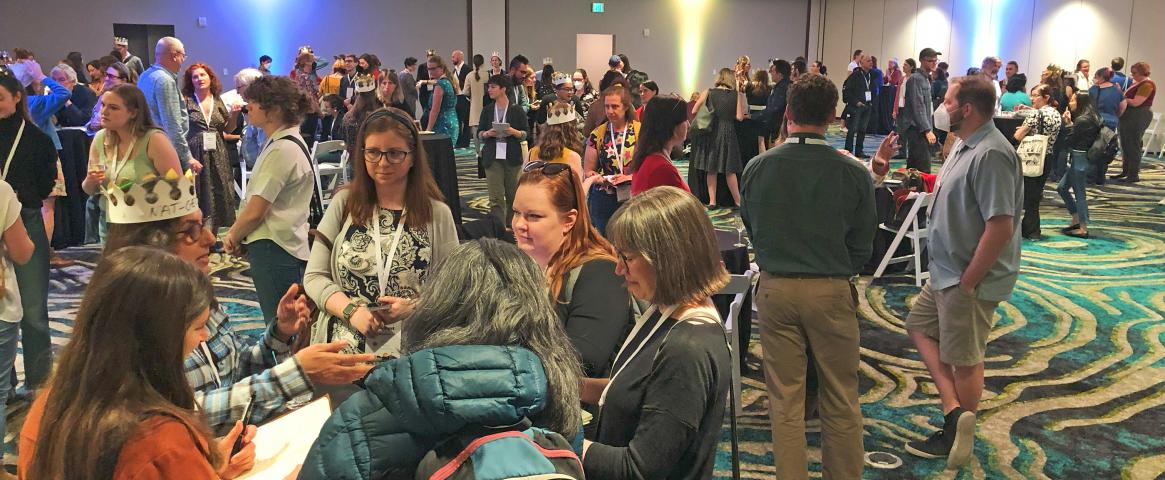Story by Ashley Atkinson
Photography by Ashley Aktinson and Nora Bradford
By Sunday morning — day three of #SciWri23, my first ScienceWriters national conference — I had fallen into a groove. As a current master's student at Johns Hopkins University and an early career science writer, I was originally nervous to attend an event with more than 800 participants in total. However, with the National Association of Science Writers’ support and the encouragement of a classmate I had met during a residency, I dove head-first into this sea of science writing and began to swim.
The Fresh Faces Meetup earlier on Friday, organized by Angel Kumari and Erin Rode, had given me a school of friends to travel and converse with. We have diverse backgrounds, but all hold the common ambition of sharing science with the world. With numbers exchanged and schedules coordinated, we began soaking in the knowledge around us. We found this to be an easy process, as other attendees were thrilled to share experiences and tips with us, subduing our Impostor Syndromes and solidifying our sense of belonging.
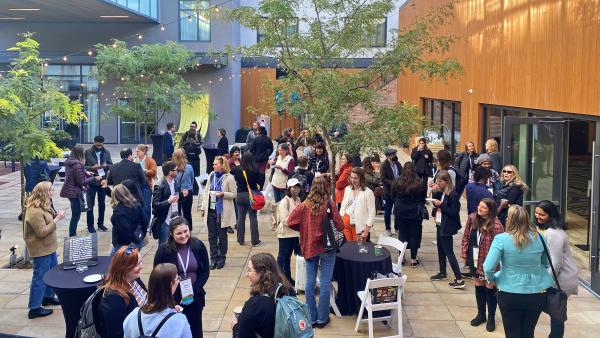 First-time attendees mingle with NASW board members and other ScienceWriters2023 registrants at the Oct. 6 Fresh Faces networking social. (Nora Bradford for NASW)
First-time attendees mingle with NASW board members and other ScienceWriters2023 registrants at the Oct. 6 Fresh Faces networking social. (Nora Bradford for NASW)
I arrived at Folsom Field slightly early on Sunday morning, securing a prime seating location for the plenary titled “Reporting on Indigenous Communities”. SAPIENS magazine editor Chip Colwell, freelance journalist Joseph Lee, and freelance science writer Zachary Zorich spoke on barriers and best practices for sharing the stories of communities that have been wronged repeatedly throughout history. An unfortunate yet common practice of journalists is coming into a community, taking the information they need, and then leaving without working to form a relationship with or prioritize the best interests of the people involved. Colwell, Lee, and Zorich all shared how they work to fight this norm, highlighting the importance of respecting the communities being interviewed and ensuring projects are beneficial for them. Regardless of where they are in their science communication and journalism journey, writers can benefit from approaching Indigenous communities with the intention of learning and supporting them in their struggles.
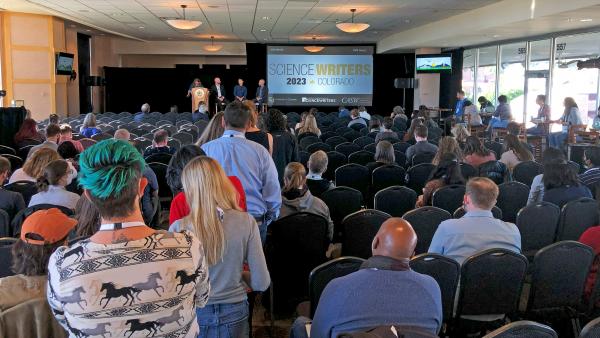 Attendees line up during question and answer time at the Reporting on Indigenous Communities NASW plenary session at ScienceWriters2023. (Ben Young Landis/NASW)
Attendees line up during question and answer time at the Reporting on Indigenous Communities NASW plenary session at ScienceWriters2023. (Ben Young Landis/NASW)
The day passed quickly after that, and I continued to meet other attendees, handing out some of my freshly printed business cards and learning more about the various forms of science writers that exist in this ecosystem. Soon, it was time for the “Science Writer for Hire” networking session: a chance for freelancers who are seeking work to meet editors and organizations who are seeking writers. While my cohort of fellow newbies and I originally felt like fish out of water, we were welcomed with open arms by the editors and staff present. Donned with silly hats to lower their intimidation factor, individuals from across the country explained their areas of interest, from earth science to medicine to artificial intelligence. One of the freelance writers attending, Donovan Cronkhite, was able to make multiple valuable connections with editors: “There were definitely a couple that I think will help me a lot starting out as a science writer,” he commented. “[One editor] asked me a lot about what I’m intending to write about.”
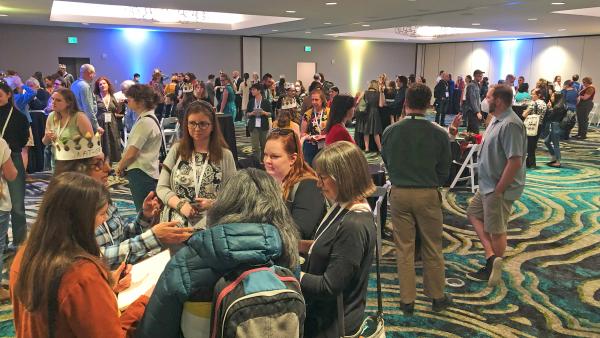 Freelancers, PIOs, and editors mingle at the #SciWri4Hire networking social hosted by NASW volunteers for ScienceWriters2023. (Ben Young Landis/NASW)
Freelancers, PIOs, and editors mingle at the #SciWri4Hire networking social hosted by NASW volunteers for ScienceWriters2023. (Ben Young Landis/NASW)
After the event ended, my new friends and I shared how our conversations went and what we had learned about the work available for freelancing science writers. It was refreshing to hear that editors and organizations alike tend to be less concerned with background and are more focused on ideas and writing samples. We had also seen more experienced freelancers advertise themselves with grace, detailing their interests and advocating for their abilities.
To celebrate completing the third day of our conference marathon, we treated ourselves to dinner, having food delivered to one of our hotel rooms. We continued to trade stories about this day, with some of our group having gone to the University of Colorado Anschutz Medical Campus for the day.
As I enjoyed my food, I took the opportunity to reflect on my experience so far. Despite being early on in my science writing journey, I was treated as an equal, making connections with people from diverse backgrounds and learning about their experiences. The ScienceWriters2023 annual meeting filled me with confidence and gave me my own writing support network. Already, I was looking forward to ScienceWriters2024, eager to strengthen the connections I had made — and continue to immerse myself in the world of science writing.
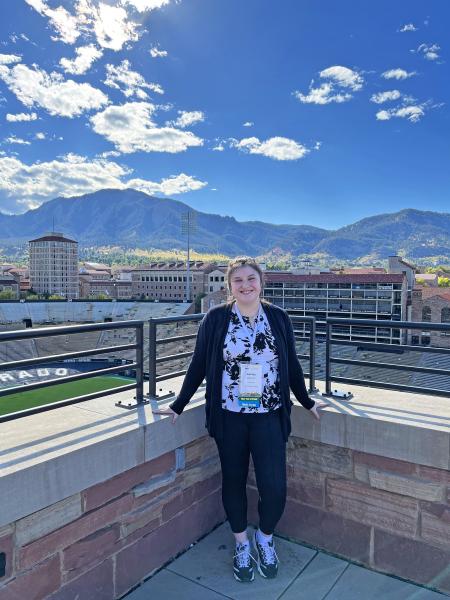 Ashley Aktinson at Folsom Field on the University of Colorado Boulder campus, during a break at ScienceWriters2023. (Ashley Atkinson for NASW)
Ashley Aktinson at Folsom Field on the University of Colorado Boulder campus, during a break at ScienceWriters2023. (Ashley Atkinson for NASW)
Ashley Atkinson (archivesofash.wordpress.com) is a current masters student studying Science Writing at Johns Hopkins University. She has undergraduate degrees in Genetics and Nutritional Sciences from Michigan State University, and enjoys writing about those topics alongside equity and inclusion in higher education and LGBTQ+ healthcare.
Nora Bradford (norabradford.com) is a freelance science writer and PhD student in cognitive science at UC Irvine. Her work has been featured in Scientific American, Science News, Discover, and other outlets.
This ScienceWriters2023 conference coverage article was produced as part of the NASW Conference Support Grant awarded to Atkinson and Bradford to attend the ScienceWriters2023 national conference. Find more 2023 conference coverage at www.nasw.org
A co-production of the National Association of Science Writers (NASW), the Council for the Advancement of Science Writing (CASW), University of Colorado Boulder, and the University of Colorado Anschutz Medical Campus, the ScienceWriters2023 national conference featured an online portion Sept. 26-Oct. 3, followed by an in-person portion held in Boulder and Anschutz, Colo., Oct. 6-10. Learn more at www.sciencewriters2023.org and follow the conversation on social media at #SciWri23
Credits: Reporting by Ashley Atkinson; edited by Ben Young Landis. Photography by Ashley Atkinson and Nora Bradford; edited by Ben Young Landis.
